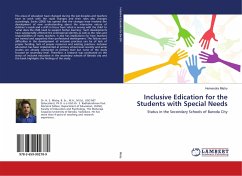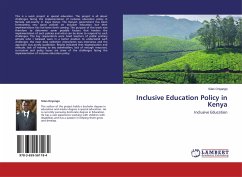
Inclusive Education in Kenya: Perspectives of Special Educators
Attitudes and Values - How can they affect Inclusion?
Versandkostenfrei!
Versandfertig in 6-10 Tagen
52,99 €
inkl. MwSt.

PAYBACK Punkte
26 °P sammeln!
It is now globally accepted that children with disabilities should be educated in inclusive settings alongside their peers. Kenya is still lagging behind in keeping abreast with the global trends and developments in inclusive education. In this respect, this book focuses on some factors impeding the progress in implementation of inclusive education in Kenya. One of the highlighted factors in this book is teachers attitudes and values. Research has shown that teachers positive attitudes toward inclusion depend strongly on their experiences with learners who are perceived as challenging . Teache...
It is now globally accepted that children with disabilities should be educated in inclusive settings alongside their peers. Kenya is still lagging behind in keeping abreast with the global trends and developments in inclusive education. In this respect, this book focuses on some factors impeding the progress in implementation of inclusive education in Kenya. One of the highlighted factors in this book is teachers attitudes and values. Research has shown that teachers positive attitudes toward inclusion depend strongly on their experiences with learners who are perceived as challenging . Teacher education/training, the availability of support within the classroom, class size and overall workload are also other factors which influence teachers attitudes. Further, the development of enabling mechanisms such as national policies on inclusion, local support systems and appropriate forms of curriculum and assessment are important in creating the right context for the development of inclusion. Inclusion has important benefits for all children as it produces schools with more enriching learning environments where diversity is viewed as a positive force which must be celebrated.












